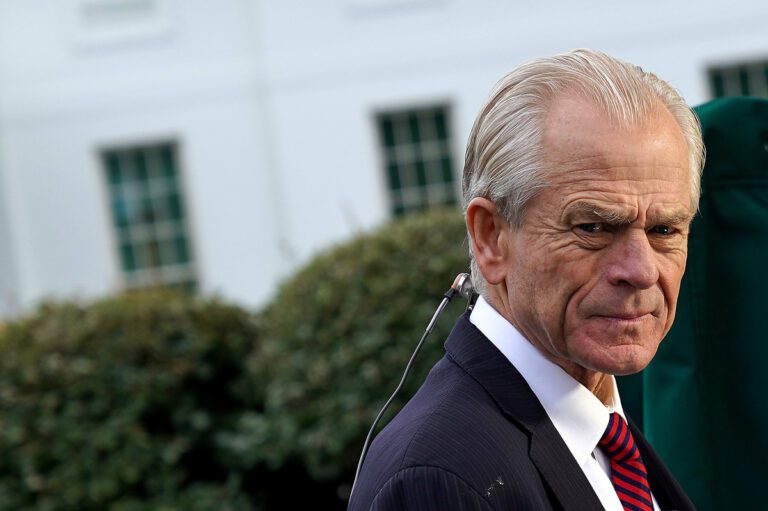🎧 Listen to This Article
WASHINGTON – In a recent statement, White House trade adviser Peter Navarro emphasized that the European Union must address its non-tariff barriers, such as value-added tax (VAT), to pave the way for a more significant trade agreement with the United States. Navarro’s comments, made on CNBC, come after European Commission President Ursula von der Leyen signaled readiness for a “zero-for-zero” tariff pact on industrial goods. However, Navarro stressed that lowering tariffs alone would not be enough for meaningful trade progress; the EU must also address non-tariff barriers, which he believes play a far larger role in trade friction.
According to Navarro, these barriers extend beyond tariff rates to include regulations such as food safety standards, which he argued are “orders of magnitude” more crucial than tariffs themselves. He pointed to the EU’s 19% VAT, calling for its reduction, and further criticized the EU’s protectionist stance on agricultural goods, urging respect for World Trade Organization (WTO) rulings allowing the U.S. to export products like pork, beef, and corn to EU countries.
Context & Background: What’s Driving the Push?
Navarro’s remarks underscore the ongoing tensions between the U.S. and the EU regarding trade policies. While both sides have signaled interest in lowering industrial tariffs, Navarro’s insistence on addressing non-tariff barriers highlights a key difference in how the two parties view trade relations. Under the Trump administration, the U.S. implemented significant tariffs on EU goods, arguing that they were necessary to level the playing field and address trade imbalances.
Non-tariff barriers, like VAT and food safety standards, are often seen as indirect methods of protectionism. These regulations can disproportionately impact foreign exporters by increasing the costs of doing business in the EU, even without explicit tariff rates being imposed. By calling attention to these factors, Navarro is setting the stage for broader trade discussions that could go beyond mere tariff reduction.
Impact on US-EU Trade: Who’s Affected?
Navarro’s call to address VAT and food safety regulations will particularly affect U.S. agricultural exporters and businesses engaged in trade with the EU. U.S. pork, beef, and corn producers, in particular, have faced significant hurdles due to the EU’s regulatory standards, which often diverge from U.S. practices. These non-tariff barriers have hindered the competitiveness of American goods within the EU market.
The EU’s VAT system also plays a crucial role in limiting the market access of U.S. companies. With a VAT rate of 19%—one of the highest in the world—companies that export to the EU must either absorb the cost or pass it on to consumers, which can make U.S. goods less attractive in comparison to local European products. Reducing VAT or providing exemptions could help U.S. exporters become more competitive in the EU.
Government & Expert Reactions: Will the EU Respond?
Navarro’s comments have sparked mixed reactions. While the White House is firm on its stance that non-tariff barriers need to be addressed, it remains to be seen whether the EU will be willing to make concessions on VAT and food safety regulations. European officials have repeatedly stated their commitment to open trade but have also pointed out that regulatory standards are often grounded in public health and safety concerns.
Trade experts suggest that while VAT reductions may be politically challenging in the EU, there may be room for negotiation on other non-tariff barriers, particularly those related to agricultural goods. With both sides signaling a willingness to negotiate, future trade talks could focus on aligning regulatory standards without compromising public health priorities.
What’s Next? Looking Ahead to Trade Negotiations
The U.S. and EU’s ongoing trade discussions are set to continue with a focus on finding common ground on both tariff and non-tariff barriers. While the proposed “zero-for-zero” tariff deal on industrial goods represents a step in the right direction, Navarro’s emphasis on non-tariff issues suggests that future talks will delve deeper into regulatory alignments and compromises.
As both sides prepare for further negotiations, businesses on both sides of the Atlantic should stay informed about potential changes to trade regulations, particularly those related to VAT and food safety standards. Adjustments to these areas could significantly impact the costs and accessibility of goods, with long-term implications for international supply chains.
Conclusion: The Path to Balanced Trade
Navarro’s comments highlight the complexity of U.S.-EU trade relations, where tariff reductions are just one piece of the puzzle. Non-tariff barriers, including VAT and regulatory standards, remain a critical point of contention that could shape future trade agreements. As both sides continue to negotiate, businesses will need to adapt to potential changes and engage with policymakers to ensure that trade regulations are fair and equitable.
For further details, clarification, contributions, or any concerns regarding this article, please contact us at editorial@tax.news. We value your feedback and are committed to providing accurate and timely information. Please note that our privacy policy will handle all inquiries



